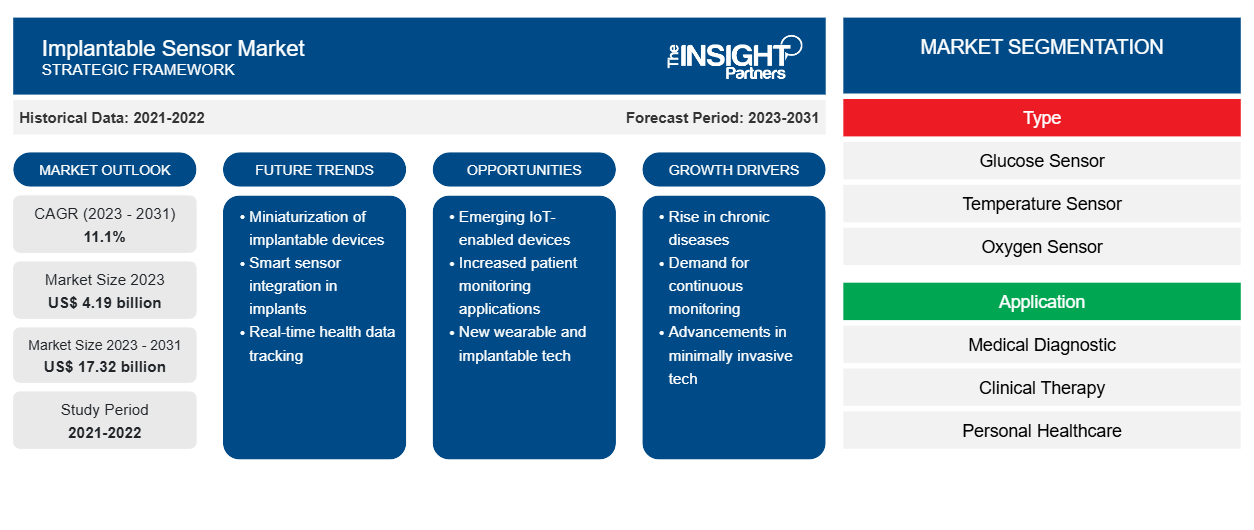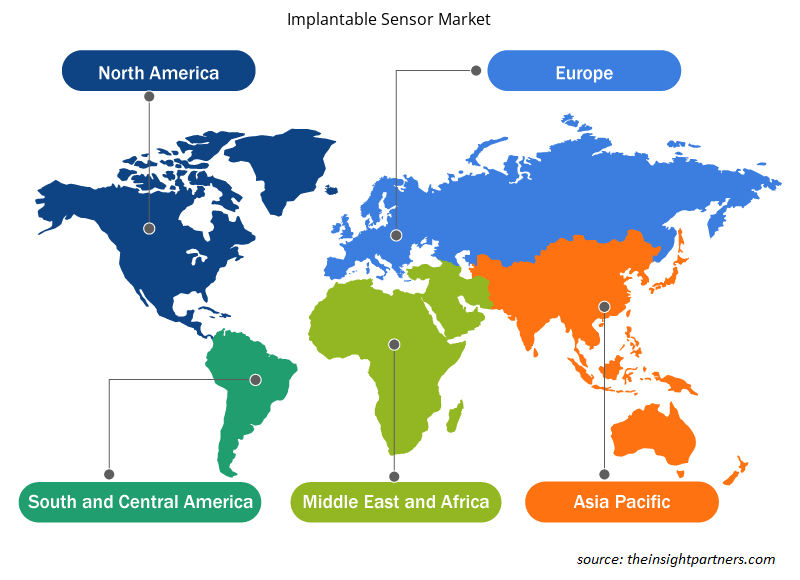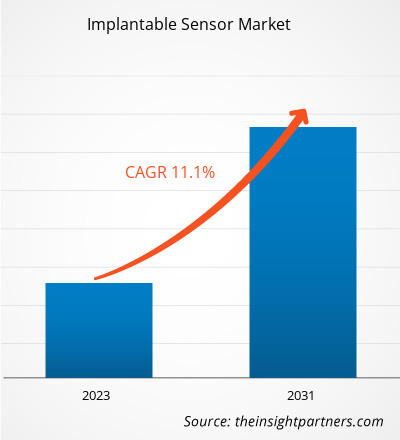The Implantable Sensor Market size was estimated to be US$ 4.19 billion in 2023 and is expected to reach US$ 17.32 billion by 2031.
It is estimated to record a CAGR of 11.1% till 2031. Development of novel speech therapies, alternative methods of communication, increased newborn hearing screenings, and use of artificial intelligence in speech therapies are likely to remain key implantable sensor Market trends.
Implantable Sensor Market Analysis
Implantable sensors are small medical devices put inside the body to observe the various body physiological parameters, such as temperature, pressure, glucose level, or drug concentration. Such products have received tremendous attention in the healthcare industry. The device is able to provide real-time data to healthcare specialists for better management of chronic medical conditions or pre/post-surgery monitoring. The increasing prevalence of chronic medical conditions is expected to favor the development of new products and drive the implantable sensor market.
Implantable Sensor Market Overview
The growth of the market is attributed to some key driving factors, such as increasing chronic disease prevalence and growing adoption of mobile healthcare technologies. However, the low rate of adoption in emerging countries is a major factor hindering the market growth. The global implantable sensor market is segmented by region into North America, Europe, Asia Pacific, Middle East & Africa, and South & Central America. In North America, the US is the largest market for implantable sensors. The growth of the region is attributed to the presence of key market players and growing product developments. In addition, continuous product developments are further expected to stimulate the growth of the implantable sensor market in North America. The Asia Pacific region is expected to account for the fastest growth in the implantable sensor market.
Customize This Report To Suit Your Requirement
You will get customization on any report - free of charge - including parts of this report, or country-level analysis, Excel Data pack, as well as avail great offers and discounts for start-ups & universities
Implantable Sensor Market: Strategic Insights

- Get Top Key Market Trends of this report.This FREE sample will include data analysis, ranging from market trends to estimates and forecasts.
You will get customization on any report - free of charge - including parts of this report, or country-level analysis, Excel Data pack, as well as avail great offers and discounts for start-ups & universities
Implantable Sensor Market: Strategic Insights

- Get Top Key Market Trends of this report.This FREE sample will include data analysis, ranging from market trends to estimates and forecasts.
Implantable Sensor Market Drivers and Opportunities
Growing Adoption of Mobile Healthcare Technologies to Favor Market
The growing adoption of mobile healthcare technologies is revolutionizing healthcare delivery by providing convenient access to medical information, monitoring, and communication tools through smartphones, wearable medical devices, and others. The trend is empowering individuals to take charge of health, facilitating remote patient monitoring, improving access to healthcare services, and improving the overall patient experience. Chronic disorders like diabetes, blood pressure, and arrhythmia detection are major drivers of the global implantable sensor market share.
Government Support to Medical Technologies – An Opportunity in Implantable Sensor Market
Investments in medical research and development activities are on the rise across the world. As per the US Investments in Medical and Health Research and Development 2016—2020 report, investments in the US for medical and health R&D were increased by US$ 48.5 billion or 42% from 2016 to 2020, and the federal investments were increased by US$ 21.4 billion or 53.5% from 2016 to 2020. The investment in medical technology also increased by 36.49% from 2016 to 2020. Thus, government support in advancing medical technologies is seen to leave a positive impact on the implantable sensor market, as it has an opportunity for medical device manufacturers.
Implantable Sensor Market Report Segmentation Analysis
Key segments that contributed to the derivation of the implantable sensor market analysis are type, application, and end user.
- Based on type, the implantable sensor market is divided into glucose sensors, temperature sensors, oxygen sensors, pressure sensors, and others. The software segment held a larger market share in 2023. The glucose sensor segment held the largest share of the market in 2023, whereas the oxygen sensor segment is anticipated to register the highest CAGR in the market during the forecast period.
- By application, the market is segmented into medical diagnostic, clinical therapy, personal healthcare, and imaging. The medical diagnostic segment held the largest share of the market in 2023; however, the personal healthcare segment is expected to register the highest CAGR in the market during 2024–2031.
- In terms of end users, the market is bifurcated into hospitals, clinics, and diagnostic centres. The hospital segment dominated the market in 2023, and it is estimated to register the highest CAGR in the market during the forecast period.
Implantable Sensor Market Share Analysis by Geography
The geographic scope of the implantable sensor market report is mainly divided into five regions: North America, Asia Pacific, Europe, Middle East & Africa, and South America/South & Central America.
North America has dominated the implantable sensor market. As per the American Diabetes Association, nearly 38.4 million Americans, or approx. 11.6% of the population will be living with diabetes disorder in 2021, Out of which the elderly population or those 65 and older hold the majority of the share. Due to rising incidences of diabetes in the region, North America held the largest share in 2022. An inclination toward technically advanced products and the presence of global market players are factors contributing to the dominance of the North America implantable sensor market. Asia Pacific is anticipated to grow with the highest CAGR in the coming years.
Implantable Sensor Market Regional Insights
The regional trends and factors influencing the Implantable Sensor Market throughout the forecast period have been thoroughly explained by the analysts at The Insight Partners. This section also discusses Implantable Sensor Market segments and geography across North America, Europe, Asia Pacific, Middle East and Africa, and South and Central America.

- Get the Regional Specific Data for Implantable Sensor Market
Implantable Sensor Market Report Scope
| Report Attribute | Details |
|---|---|
| Market size in 2023 | US$ 4.19 billion |
| Market Size by 2031 | US$ 17.32 billion |
| Global CAGR (2023 - 2031) | 11.1% |
| Historical Data | 2021-2022 |
| Forecast period | 2023-2031 |
| Segments Covered |
By Type
|
| Regions and Countries Covered | North America
|
| Market leaders and key company profiles |
Implantable Sensor Market Players Density: Understanding Its Impact on Business Dynamics
The Implantable Sensor Market is growing rapidly, driven by increasing end-user demand due to factors such as evolving consumer preferences, technological advancements, and greater awareness of the product's benefits. As demand rises, businesses are expanding their offerings, innovating to meet consumer needs, and capitalizing on emerging trends, which further fuels market growth.
Market players density refers to the distribution of firms or companies operating within a particular market or industry. It indicates how many competitors (market players) are present in a given market space relative to its size or total market value.
Major Companies operating in the Implantable Sensor Market are:
- Analog Devices, Inc.
- DEXCOM, INC.
- Glusense Ltd.
- Honeywell International Inc.
- Medtronic
- NXP SEMICONDUCTORS N.V.
Disclaimer: The companies listed above are not ranked in any particular order.

- Get the Implantable Sensor Market top key players overview
Implantable Sensor Market News and Recent Developments
The Implantable Sensor Market is evaluated by gathering qualitative and quantitative data post primary and secondary research, which includes important corporate publications, association data, and databases. The following is a list of developments in the market for implantable sensors and strategies:
- In December 2023, Medstar became the first company in the world to implant Cordella sensor implant for advanced heart failure. The sensor remotely sends the patient’s pulmonary artery pressure via a wireless microelectromechanical sensor to the team of doctors. With this real-time data, doctors can proactively adjust medications and therapies with the goal of reducing HF hospitalizations. (Source: MedStar Health, Press Release, 2024)
- In Feb 2022, Ascensia Diabetes Care, a global diabetes care company, announced that its partner Senseonics Holdings, Inc. has received approval from the US Food and Drug Administration (FDA) for the next-generation Eversense® E3 Continuous Glucose Monitoring (CGM) System. Ascensia plans to make the Eversense E3 sensor, which can be used for up to 6 months, available to patients in the US (Source: Ascensia Diabetes Care Holdings AG., Senseonics, Inc. Press Release/Company Website/Newsletter, 2024)
Implantable Sensor Market Report Coverage and Deliverables
The “Implantable Sensor Market Size and Forecast (2024–2031)” report provides a detailed analysis of the market covering below areas:
- Market size and forecast at global, regional, and country levels for all the key market segments covered under the scope
- Market dynamics such as drivers, restraints, and key opportunities
- Key future trends
- Detailed PEST/Porter’s Five Forces and SWOT analysis
- Global and regional market analysis covering key market trends, major players, regulations, and recent market developments
- Industry landscape and competition analysis covering market concentration, heat map analysis, prominent players, and recent developments
- Detailed company profiles
- Historical Analysis (2 Years), Base Year, Forecast (7 Years) with CAGR
- PEST and SWOT Analysis
- Market Size Value / Volume - Global, Regional, Country
- Industry and Competitive Landscape
- Excel Dataset
Testimonials
Reason to Buy
- Informed Decision-Making
- Understanding Market Dynamics
- Competitive Analysis
- Identifying Emerging Markets
- Customer Insights
- Market Forecasts
- Risk Mitigation
- Boosting Operational Efficiency
- Strategic Planning
- Investment Justification
- Tracking Industry Innovations
- Aligning with Regulatory Trends
Yes! We provide a free sample of the report, which includes Report Scope (Table of Contents), report structure, and selected insights to help you assess the value of the full report. Please click on the "Download Sample" button or contact us to receive your copy.
Absolutely — analyst assistance is part of the package. You can connect with our analyst post-purchase to clarify report insights, methodology or discuss how the findings apply to your business needs.
Once your order is successfully placed, you will receive a confirmation email along with your invoice.
• For published reports: You’ll receive access to the report within 4–6 working hours via a secured email sent to your email.
• For upcoming reports: Your order will be recorded as a pre-booking. Our team will share the estimated release date and keep you informed of any updates. As soon as the report is published, it will be delivered to your registered email.
We offer customization options to align the report with your specific objectives. Whether you need deeper insights into a particular region, industry segment, competitor analysis, or data cut, our research team can tailor the report accordingly. Please share your requirements with us, and we’ll be happy to provide a customized proposal or scope.
The report is available in either PDF format or as an Excel dataset, depending on the license you choose.
The PDF version provides the full analysis and visuals in a ready-to-read format. The Excel dataset includes all underlying data tables for easy manipulation and further analysis.
Please review the license options at checkout or contact us to confirm which formats are included with your purchase.
Our payment process is fully secure and PCI-DSS compliant.
We use trusted and encrypted payment gateways to ensure that all transactions are protected with industry-standard SSL encryption. Your payment details are never stored on our servers and are handled securely by certified third-party processors.
You can make your purchase with confidence, knowing your personal and financial information is safe with us.
Yes, we do offer special pricing for bulk purchases.
If you're interested in purchasing multiple reports, we’re happy to provide a customized bundle offer or volume-based discount tailored to your needs. Please contact our sales team with the list of reports you’re considering, and we’ll share a personalized quote.
Yes, absolutely.
Our team is available to help you make an informed decision. Whether you have questions about the report’s scope, methodology, customization options, or which license suits you best, we’re here to assist. Please reach out to us at sales@theinsightpartners.com, and one of our representatives will get in touch promptly.
Yes, a billing invoice will be automatically generated and sent to your registered email upon successful completion of your purchase.
If you need the invoice in a specific format or require additional details (such as company name, GST, or VAT information), feel free to contact us, and we’ll be happy to assist.
Yes, certainly.
If you encounter any difficulties accessing or receiving your report, our support team is ready to assist you. Simply reach out to us via email or live chat with your order information, and we’ll ensure the issue is resolved quickly so you can access your report without interruption.















- Analog Devices, Inc.
- DEXCOM, INC.
- Glusense Ltd.
- Honeywell International Inc.
- Medtronic
- NXP SEMICONDUCTORS N.V.
- Pinnacle Technology Inc.
- Sensirion AG
- TE Connectivity
- Texas Instruments Incorporated






 Get Free Sample For
Get Free Sample For